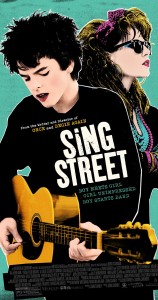
Cosmo (Ferdia Walsh-Peelo) is a ballsy kid. Despite being the bullied and seemingly stereotypical shy kid, he waltzed right up to the mysterious Raphina (Lucy Boynton) and makes his move. Mind you, he doesn’t ask her out (he’s not that ballsy), but he tells the self-professed model that his band is filming a music video and they need a female star, and he wants her to be that star. She agrees after making him sing “Take on Me.” All he has to do now is form a band.
On the surface, “Sing Street” is a prototypical teen romance film. It has the unattainable love being sorely sought after, an asshole of a boyfriend getting in the way, troubling family situations, a totalitarian school ruled with an iron fist, and one’s art being used as an escape from the Hell that is life. What John Carney does well is to avoid succumbing to painting the story in broad strokes, instead crafting an honest portrayal of the material. We may know how everything is going to play out, but we’re more than willing to take the ride there.
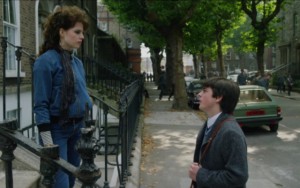
It’s not a spoiler to say Cosmo wins over Raphina’s heart, though I won’t go as so far to say if he keeps it until the credits roll. What matters is not an element of surprise, but in the chemistry between Cosmo and Raphina. Ferdia and Boynton are electric together, creating sparks almost instantly. You can tell Raphina is drawn to Cosmo’s muted confidence, even if it’s only in a friendly manner at first. Much like her, we’re drawn to Cosmo because of his personality and fear for him emotionally when we know the heartache is coming. From the start we’re on board for this romance, no matter how many obvious beats it may play.
It comes as a surprise to me that this is Ferdia’s first acting role. This, much like the character of Cosmo, is a ballsy move on John Carney’s part, one that pays off swimmingly! Cosmo’s muted confidence shines because that’s how Ferdia approaches his role. He has the screen presence of a natural, playing off of others with relative ease. He exudes so much confidence in himself that he breathes more life into Cosmo than I believe was written for him. With that being said, Carney writes the character so well, never resorting to making him a bullied loner who sheepishly makes his presence felt at the end. Cosmo progresses like a natural teenager, being shy around most but dripping with confidence when amongst his peers.
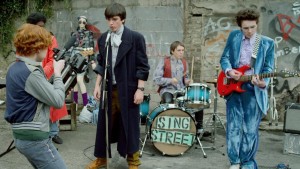
Lucy Boynton deserves just as much praise, being given the unenviable task of being the mysterious girl. She has to come off as too cool for school, but show vulnerability at the same time. She does this to perfection, utilizing body language to elicit drama. Her eyes tell more of a story than any of her dialogue. We feel her pain as she longingly stares at Cosmo, knowing he’s the right one for her but not feeling as if she deserves him. We know she’ll make the wrong decisions, such as sticking with her doltish boyfriend, but we understand why and are patient to wait for her to come around.
It’d be easy to criticize the lack of development of subplots, but that would be to miss the point. Subplots such as Cosmo’s parents going through a divorce, Raphina dealing with having no parents, and Brother Baxter’s (Don Wycherley) abusive control over his students are only as developed as Cosmo wants them to be. The entire film is seen through Cosmo’s eyes, which is why everything outside of his romance with Raphina comes across as foggy. He views the world with disdain, so much so that he does his best to block everything out. We mostly hear his parents fighting in the background because Cosmo has chosen to shut them out. To further develop them would be a disservice to Cosmo’s journey, as he only sees them as blips on his quest to success; to give them more would be misguided.
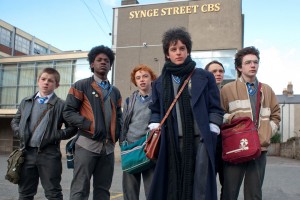
This is why most of Cosmo’s bandmates come across as background fodder. In the scope of Cosmo’s life, they’re simply musical instruments with human avatars. Only Eamon (Mark McKenna) feels fleshed out because Cosmo allows him to be when assisting him in writing songs. Same goes for Brendan (Jack Reynor), Cosmo’s brother, who acts as his personal music teacher and father figure. Brendan is the only family member he feels a connection with, which is why he’s allowed to have an emotional breakthrough; Cosmo needs Brendan to open up in order for Cosmo to find himself.
John Carney has made a career out of using music in film to tell a story. “Sing Street” is no different, with music being the driving force behind everything. It’s Cosmo’s escape from the hellish landscape that is Dublin, Ireland in the mid-eighties. It’s also Cosmo’s key to love and finding himself; the more he grows as a person, the more his music does as well. It’s charming how Cosmo starts off aping famous musicians because he feels he has to write like they do, only to discover his music is at its best when it’s a reflection on his life. The soundtrack is the driving force behind the growth of Cosmo, not just a catchy passenger used to sell albums.
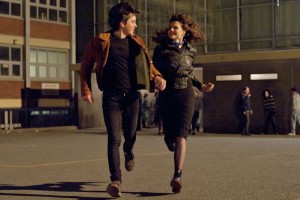
Despite being grounded in reality, “Sing Street” is on the fantastical side of storytelling. One has to accept that Sing Street learns how to play their instruments rather quickly and so precisely. To not go along with that would make the film as a whole hard to swallow. If one goes with it, they’ll be treated to a musical love story that is pure joy!
Final Rating: A-
